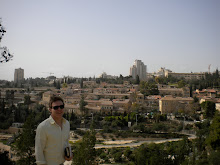
Our first stop was at a lookout east northeast of the Biblical site of Shiloh. The view was lost completely to the fog; we were unable to see more than about one hundred feet off the hill. However, from the comfort of the bus, I found the information extremely interesting. It was cool to learn about the tribe of Joseph, that found its own portion to be undesirable because it was too small. Rather than forcing this tribe to stick to what was given to them, Joshua ultimately empathized with their situation and provided another option for them. He gave the tribe Joseph, Ephraim and Manasseh, not just the hill country, but the forest that was beyond it. They were to “clear it and possess it to its farthest borders” (Josh. 17:18). This portion of the land was also the inheritance of Israel’s leader, as Joshua himself was buried there, in the city of Timnath-serah, north of the mountain of Gaash (Josh. 24:30).
After this we made the climb up Mount Gerazim, which is north of Shiloh and Michmathah, just east of Shechem. This is the site where, according to Moses in Deuteronomy 27, the Israelites will be blessed by the Levites (the descendents of Aaron, the tribe of priests). My fellow Taylor student and roommate, Dave Moran, memorized the passage of Levitical blessings upon the Israelites while standing upon this Mount. It was incredible to hear these blessings shouted out in a loud voice, and to be standing on the same mountain that they would have been shouted it over three thousand years ago! It is only in this land that I have truly begun to understand how much God is necessary for the survival, not to mention prosperity, of a people group. The Israelites were mice in a land where cats ruled; surrounded by empires of enormous might and power, the Lord’s people were utterly dependent on Him. The only requirement they were to meet to gain the Lord’s favor was to love him with all their hearts and obey His commandments. But they were unable to, and the consequences soon followed.
Afterwards, we visited the Samaritan Museum and afterwards treated with the best hospitality we had yet received since arriving in Israel (they gave our entire group of 30+ students tea!). I was intrigued by the theology and worldview that was held by the Samaritan man who gave us the presentation. He made every attempt to show us the validity of the family line of the Samaritans and their connection with the patriarchs of Israel, all the back to Adam. But as is standard in Eastern culture, there was no effort made to show any sort of legitimate historical evidence for this other than his display of a family tree. This concept has been one of the most challenging for me to deal with while studying in Jerusalem. Along with the site of the Church of the Arc, it seems so strange (and even a little delusional) to hold certain traditions as true when it can almost certainly be proved false. I have been wrestling with God about this lately, asking Him to remove the barriers that are attached to my Western, Protestant perspectives that I may see what He desires me to see in this land. Despite the intellectual difficulties that these likely-incorrect traditions and traditional sites bring, they have been helpful to the growth of faith of many, many people. In the class, History of the Chuch in the East, our Professor, Dr. Petra Heldt asked us if certain (or any) traditions have helped bring people to the Truth (a.k.a. to know Jesus), can we really say that they are not true, regardless of their unlikelihood? It has rocked my understanding of what is True in the eyes of God, and I am eager to continue exploring this concept. This may seem strange to anyone who is reading this, as it did to me at first, but consider chewing on this final example:
There is a church built upon "Jacob's Well," the site of many Biblical stories, the most common being Jesus and the Samaritan woman at the well (Jn. 4). It was here where He claimed to be able to give living water and many came to believe based on the woman's testimony. This story is an inspiration to us, reminding us to drink the water He gives, but in the Middle East, surrounded by hundreds of other 'sacred' scriptures (from various religions and cultic groups), it can be incredibly beneficial to have a tangible location to mark this event, because it happened somewhere in the area. Does it matter if this event didn't take place here? Or can we consider it True because it brings people to Jesus? Or does using the word "Truth" in this instance require us to redefine what it actually means, or more importantly, what we actually value within our own hearts.









